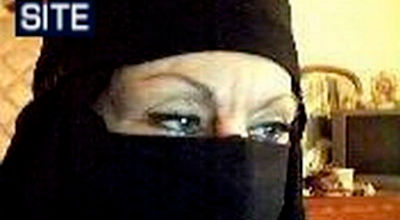Jihad Jane: The FBI Visits, the Jihad Begins
‘So Close’
LaRose and Ramirez each landed in Ireland within days of the other, during the second week of September. On the day she arrived, Ramirez married Damache.
There would be no honeymoon.
Instead, with Ramirez’s young son, they all stayed in a one-bedroom apartment Damache rented in the heart of Waterford. The flat stood steps from upscale Italian and Chinese restaurants and the city archives, on a neat, narrow street close to the central shopping mall, riverfront and Catholic church.
The sleeping arrangements proved awkward. At times, the women stayed with the boy in the living room; Damache took the bedroom for himself.
Despite the unorthodox accommodations, LaRose remained committed to the notion of killing the Swedish artist. With little direction, she was doing what she could, tracking her target the only way she knew how: online.
To try to learn more about Vilks, for example, she signed up for a virtual community he had created. Filling out the online form, LaRose typed a false name—Sally Jones—and created a new Gmail account.
She also left a clue that underscored her sloppiness. In the postal code section of the online form, she typed 48174—the zip code for Romulus, Mich., her childhood home.
Damache gave LaRose a key to the Waterford apartment, and she was free to come and go. Ramirez focused on supporting her new husband’s activities, whatever they were. She didn’t get a key and was instructed to remain at home, to cook and to clean.
Local Muslim women took LaRose to the mosque and taught her how to pray. The first time she rose after praying, LaRose experienced what she believed to be a minor miracle. A persistent pain in her stomach, one that had bothered her for years, simply vanished. LaRose was astonished. What more proof did she need that Islam could heal her?
Her faith in the jihad was another story. In the weeks that followed, nothing materialized the way Damache had promised. No training, no planning, no brothers and sisters waiting to join her in assassination. To LaRose, the great Black Flag seemed nearly as unmoored as she was—chronically unemployed, spouting verses from the Quran to justify whatever he chose to do, hiding his cowardice behind his beard.
LaRose still refused to give up her jihad. On the last day of September, she emailed Eagle Eye to let him know she remained on task and that it would be “an honor & great pleasure to kill” the artist.
“Only death will stop me here,” LaRose wrote. “I am so close to the target!”
She hadn’t trained as an assassin and she hadn’t traveled to Sweden. But she was back on Muslima.com, the Islamic dating site, hoping to find someone who might put her up in Sweden—should she ever get there.
The Epiphany
Two weeks after promising that “only death” would stop her plans to kill for Allah, Jihad Jane decided to head home.
The epiphany came while she waited with a Muslim woman in a delivery truck outside a grocery in Waterford. The two women were covered head to toe. Only their eyes showed. The woman’s husband was inside shopping.
Sitting in the truck, LaRose considered the woman’s life. She had a husband, children, a family and a bond with Allah. The woman seemed happy, LaRose thought. And she wanted that sort of happiness, too.
LaRose considered Damache and Abdullah again. Online, the men were aggressive, tough-talking jihadists, romantic, almost heroic. In person—in reality—they were tentative, chauvinistic and, perhaps most telling, hobbled by pedestrian struggles like finding enough cash to pay the electric bill.
LaRose asked the woman waiting with her in the truck what she thought of Damache. The woman replied that her husband believed LaRose was a lost soul and that Damache had misled her. Perhaps Vilks, the Swedish artist, did deserve to die, but that was up to Allah, not Damache, to decide, she said.
The woman and her husband were the first Muslims LaRose had met who did not advocate violence. They were wonderful, deeply religious people, and they held a starkly different version of Islam than the likes of Eagle Eye and Black Flag.
LaRose considered all this, sitting in the truck. Again, she felt torn. She wanted to please Eagle Eye, but nothing, not a single thing she had been promised, had worked out.
She was also growing lonely and missed her longtime boyfriend back in Pennsylvania. She wondered who was caring for her elderly mother. She thought about her cats, Fluffy and Klaus.
Jihad Jane was homesick.
She emailed her boyfriend with her new Irish mobile number. A short while later, he called. Come home, he urged. Your mother is ill, near death.
Today, LaRose insists that she wasn’t abandoning her jihad, only pausing to visit a sick relative.
If so, what this budding terrorist did next is perplexing: She visited the FBI’s website, located the send-a-tip section and let agents know she was heading home.
The reason? She hoped the FBI would pay for her flight.
When LaRose got no response, she called her boyfriend back and he bought her ticket.
Damache tried to talk her out of leaving. He pleaded for patience, but LaRose insisted she needed to return to care for her sick mother.
LaRose said goodbye to Ramirez and her son, and reluctantly, Damache agreed to drive her to the airport in Cork. It was a two-hour trip along scenic and often rural roads.
Unannounced, Damache brought a husky friend along for the ride, a man LaRose had never met.
As the car left Waterford, LaRose grew suspicious. They were never going to let her go back to the United States, she thought. She knew too much—where they lived, what they were planning, everything.
They weren’t driving her to the airport, she thought. It was all a setup.
They were going to make Jihad Jane disappear.
HOW THIS SERIES WAS REPORTED
JANE’S JIHAD is based on six months of reporting in Pennsylvania, Texas, Maryland, Colorado, Washington, D.C., and Ireland. The accounts, including the thoughts and actions of characters in the stories, are based on court records and other documents, many of them confidential, as well as interviews with people involved in the case. Reporter John Shiffman gained exclusive access to those documents and individuals. Many spoke only on condition of anonymity. In Ireland, the law forbids the government and defense lawyers from commenting until court proceedings are completed. In the United States, prosecutors do not typically comment before sentencing. The Reuters interview with Colleen LaRose, the woman who called herself Jihad Jane, is the only one she has granted. This is Part 3 of an exclusive four-part series. Click here for Part 1; click here for Part 2.
Editing by Blake Morrison.
© 2012 Thomson Reuters. All rights reserved.




























































